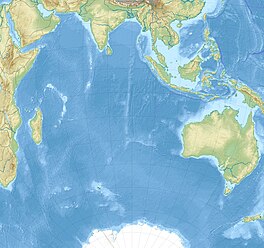Vahsel Glacier (53°04′S 73°23′E / 53.067°S 73.383°E) is a glacier on the northwestern side of Heard Island in the southern Indian Ocean. It flows west into South West Bay, between Erratic Point and Cape Gazert.[6][7] Immediately to the north of Vahsel Glacier is Schmidt Glacier, whose terminus is located between Mount Drygalski and North West Cornice. To the south of Vahsel Glacier is Allison Glacier, whose terminus is located south of Cape Gazert, which separates Allison Glacier from Vahsel Glacier.
| Vahsel Glacier | |
|---|---|
 Location of Heard Island and McDonald Islands on the globe | |
| Type | cirque/tidewater |
| Location | Heard Island Territory of Heard Island and McDonald Islands Australia |
| Coordinates | 53°04′S 73°23′E / 53.067°S 73.383°E |
| Thickness | approximately 55 meters |
| Terminus | South West Bay, between Erratic Point and Cape Gazert |
| Status | Retreating[1][2][3][4][5] |
 | |
Discovery and naming
editVahsel Glacier was charted in 1902 by the German Antarctic Expedition under Erich von Drygalski.[7] A landing party was sent ashore near Atlas Cove on 3 February 1902. Drygalski named the glacier for Richard Vahsel, an officer of the landing party of the Gauss expedition who conducted investigations near Atlas Cove. Vahsel was later captain of Wilhelm Filchner's Deutschland; he died in August 1912 during the drift of the Deutschland.[6]
References
edit- ^ Ian F. Allison & Peter L. Keage (1986). "Recent changes in the glaciers of Heard Island". Polar Record. 23 (144): 255–272. doi:10.1017/S0032247400007099. S2CID 130086301.
- ^ Andrew Ruddell (25 May 2010). "Our subantarctic glaciers: why are they retreating?". Glaciology Program, Antarctic CRC and AAD. Retrieved 5 June 2010.
- ^ Quilty, P.G. & Wheller, G. (2000). "Heard Island and the McDonald Islands: A window into the Kerguelen Plateau (Heard Island Papers)". Pap. Proc. R. Soc. Tasm. 133 (2): 1–12.
- ^ Budd, G.M. (2000). "Changes in Heard Island glaciers, king penguins and fur seals since 1947 (Heard Island Papers)". Pap. Proc. R. Soc. Tasm. 133 (2): 47–60.
- ^ Douglas E. Thost; Martin Truffer (February 2008). "Glacier Recession on Heard Island, Southern Indian Ocean". Arctic, Antarctic, and Alpine Research. 40 (1): 199–214. doi:10.1657/1523-0430(06-084)[THOST]2.0.CO;2. S2CID 130245283. Archived from the original on 4 December 2012. Retrieved 7 June 2010.
- ^ a b "Vahsel Glacier". Australian Antarctic Data Centre. Retrieved 5 June 2010.
- ^ a b "Vahsel Glacier". Geographic Names Information System. United States Geological Survey, United States Department of the Interior. Retrieved 5 June 2010.
Further reading
edit- U. Radok & D. Watts (1975). "A synoptic background to glacier variations of Heard Island" (PDF). Snow and Ice (Proceedings of the Moscow Symposium, August 1971) (104 ed.). Wallingford, Oxfordshire, UK: International Association of Hydrological Sciences. pp. 42–56. Retrieved 7 June 2010.
- Truffer, M., Thost, D. and Ruddell, A. (2001). "The Brown Glacier, Heard Island: its morphology, dynamics, mass balance and climate setting". Antarctic CRC Research Report No. 24. Hobart, Tasmania: Cooperative Research Centre for the Antarctic and Southern Ocean Environment, University of Tasmania. pp. 1–27.
{{cite book}}: CS1 maint: multiple names: authors list (link) - Kevin Kiernan & Anne McConnell (2002). "Glacier retreat and melt-lake expansion at Stephenson Glacier, Heard Island World Heritage Area" (PDF). Polar Record. 38 (207): 297–308. doi:10.1017/S0032247400017988. S2CID 37333655. Retrieved 7 June 2010.
External links
edit- Click here to see a map of Heard Island and McDonald Islands, including all major topographical features
- Australian Antarctic Division
- Australian Antarctic Gazetteer
- Composite Gazetteer of Antarctica
- Australian Antarctic Names and Medals Committee (AANMC)
- United States Geological Survey, Geographic Names Information System (GNIS)
- Scientific Committee on Antarctic Research (SCAR)
53°04′S 73°23′E / 53.067°S 73.383°E
This article incorporates public domain material from "Vahsel Glacier". Geographic Names Information System. United States Geological Survey.
